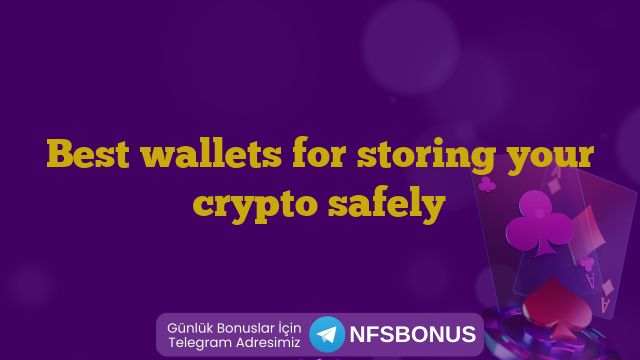Understanding The Importance Of Selecting Safe Crypto Wallets
When it comes to managing your digital assets, understanding the significance of choosing safe crypto wallets is paramount. Many cryptocurrency investors focus on potential returns but often overlook the security aspect of storing their assets. Selecting appropriate storage solutions not only protects your investments but also gives you peace of mind. With the growing threat of cyberattacks, securing your holdings in the best crypto wallets is essential to ensure their protection.
Investing in cryptocurrencies demands a well-informed approach to choosing wallets that can provide the highest level of security. Given the variety of wallet types available, from hardware to software solutions, each offers different levels of risk and convenience. Recognizing which wallets will best serve your needs is crucial. For instance, hardware wallets provide robust offline security, while software wallets offer easy accessibility for everyday transactions. Understanding these differences will help you make informed decisions about your crypto storage.
- Key Benefits Of Using A Crypto Wallet
- Enhanced security against hacking and theft.
- Easy access to your crypto for transactions.
- Control over your private keys and funds.
- Diverse options ranging from cold to hot wallets.
- Support for multiple cryptocurrencies in one location.
- Simplified tracking of your crypto portfolio.
Ultimately, securing your cryptocurrency assets with the best crypto wallets depends on several factors, including the wallet type and your individual needs. Always prioritize safety features like two-factor authentication (2FA) and backup options. This will not only safeguard your assets but also provide a systematic approach to managing your cryptocurrency effectively. Make informed choices as you navigate the landscape of crypto wallets, taking into account both security and usability for your investments.
Top Features To Look For In The Best Crypto Wallets
When choosing the best crypto wallets for safeguarding your digital assets, it’s crucial to consider several key features. The right wallet not only enhances security but also ensures ease of use and convenience for managing transactions. With the rapid evolution of the cryptocurrency landscape, understanding which features are essential can make a significant difference in protecting your investments.
One of the most vital aspects of any crypto wallet is the level of security it provides. This encompasses a range of elements, including encryption protocols, two-factor authentication, and backup options. A wallet that employs robust security measures significantly reduces the risk of unauthorized access, ensuring that your assets remain under your control.
Essential Features For Selecting Your Wallet
- High-level security protocols (encryption, two-factor authentication)
- User-friendly interface for seamless transactions
- Support for multiple cryptocurrencies
- Backup and recovery options to protect against loss
- Reputation of the wallet provider and community feedback
- Regular software updates and active development
- Integration with exchanges for easy trading
Choosing the right wallet is more than just picking a software solution; it’s about fortifying your financial future in the digital age.
As you evaluate different options, it’s also essential to understand the various types of wallets available. Each wallet type, whether hardware, software, or paper, offers unique advantages and drawbacks depending on your specific needs, investment strategy, and technical ability.
Types Of Crypto Wallets
Understanding the types of wallets is crucial for making informed decisions. Hardware wallets provide unparalleled security as they store your private keys offline, making them less vulnerable to hacking. Software wallets offer greater convenience for daily transactions and ease of access. In contrast, paper wallets allow users to have a physical copy of their keys, which might be ideal for long-term storage but introduces its own set of risks. Each type serves a particular purpose, and selecting the right one depends on personal preferences and security requirements.
Analyzing Hardware, Software, And Paper Wallets
When it comes to storing your cryptocurrency safely, choosing the right type of wallet is imperative. Understanding the various wallet types can help you make an informed decision that aligns with your security needs and personal preferences. Among the most popular options are hardware wallets, software wallets, and paper wallets, each with its own unique features and functionalities. This analysis will delve into essential aspects of these wallet types, presenting a comprehensive view of the best crypto wallets that suit different user requirements.
The first category to consider is hardware wallets. These are physical devices that securely store your private keys offline, providing a high level of protection against online threats. Hardware wallets are considered one of the most secure options available in the market. They’re ideal for long-term storage and frequently recommended to crypto enthusiasts who prioritize security over convenience. However, they can be more expensive than other wallet options and may require some technical understanding to set up and use.
Hardware Wallets
Here’s what you need to know about hardware wallets. They often come equipped with features like multi-currency support and the ability to transact without exposing your private keys to online vulnerabilities. Despite their advantages, users should be cautious of purchasing from unauthorized sellers to avoid counterfeit devices.
Software Wallets
In contrast, software wallets are applications that can be installed on your computer or smartphone, making them more user-friendly and accessible for everyday transactions. While they offer convenience, software wallets generally present a higher risk of cyber threats as they are connected to the internet. Nevertheless, many software wallets now include strong encryption and two-factor authentication, making them reliable options for both novices and experienced users who frequently trade cryptocurrencies.
Benefits And Drawbacks Of Each Wallet Type
- Hardware Wallets: Highly secure; protected against online threats.
- Software Wallets: Easy to use; ideal for daily transactions.
- Paper Wallets: Completely offline; no digital hacking risks but can be lost or damaged.
- Hardware Wallets: Generally expensive; require proper handling and storage.
- Software Wallets: Vulnerable to malware; need consistent updates and security checks.
- Paper Wallets: Difficult to use for regular transactions; not recommended for frequent access.
Understanding these different wallet types allows you to weigh their pros and cons effectively. When selecting the best crypto wallets, consider factors such as your intended use, security level desired, and ease of access. This knowledge will empower you to protect your assets robustly and navigate the crypto space confidently.
How To Set Up Your Chosen Crypto Wallet Safely
Setting up your crypto wallet correctly is essential for maintaining the security of your assets. It is important to choose the best crypto wallets that not only offer ease of use but also provide robust security features. Proper setup ensures that your cryptocurrencies are safeguarded against theft or unauthorized access. By following the right steps, you can minimize potential risks associated with crypto wallets.
To get started, make sure you do thorough research on the best crypto wallets available in the market. Determine whether a hardware wallet, software wallet, or a paper wallet meets your needs best. Regardless of the wallet type you choose, the setup process remains crucially important. This entails downloading the necessary software, creating secure passwords, and enabling additional security measures such as two-factor authentication.
Step-By-Step Guide To Wallet Setup: 1. Choose a reputable wallet based on research. 2. Download or purchase the wallet from a trusted source. 3. Create an account and set a strong password. 4. Back up your wallet by saving the recovery phrase securely. 5. Enable two-factor authentication (2FA) for added security. 6. Transfer a small amount of crypto to test wallet functionality. 7. Regularly update the wallet software to ensure it is protected against vulnerabilities.
Proper setup and configuration of your crypto wallet can greatly enhance your asset protection. As you proceed with the configuration, remain vigilant by cross-referencing the setup steps with official wallet documentation. According to industry experts, “Taking precautionary measures during wallet setup can ensure a secure environment for your transactions.” This diligent approach not only helps in the initial setup but also promotes ongoing security for your crypto holdings.
Security Best Practices For Protecting Your Crypto Assets
When considering the best crypto wallets for safeguarding your digital assets, security must be at the forefront of your decision-making process. With the increasing number of cyber threats targeting cryptocurrency, it’s imperative to implement effective security measures. Even the most advanced wallet can fall prey to hackers if not adequately protected. Taking proactive steps to secure your assets can significantly mitigate the risks associated with cryptocurrency ownership.
One of the first steps in improving your security is choosing a wallet that prioritizes safety features. Before diving into the selection process, familiarize yourself with potential vulnerabilities and the best practices for defending against them. A strong understanding of these elements will empower you to make informed choices about your crypto wallet and how you store your private keys.
Top Security Tips To Follow
- Use two-factor authentication (2FA) whenever possible.
- Keep your software up-to-date for the latest security patches.
- Never share your private keys or seed phrases.
- Regularly monitor your wallet for any unauthorized transactions.
- Consider using a hardware wallet for extra layer of security.
- Be cautious of phishing attempts and malicious software.
- Backup your wallet in secure, offline locations.
In addition to these tips, it’s essential to remain vigilant about the latest security trends in the cryptocurrency space. This includes keeping an eye on news reports about breaches or vulnerabilities that could affect your chosen wallet solution. By staying informed, you can actively adjust your security measures and be better prepared to face any challenges that may arise.
Always remember, the best defense is a good offense, especially when it comes to protecting your best crypto wallets. Taking a proactive approach to security will ultimately protect your assets.
Conclusion: Making Informed Decisions For Crypto Wallets
In the ever-evolving landscape of digital currencies, choosing the best crypto wallets is critical for safeguarding your assets. Deciding on a wallet involves understanding various options available and their respective security features. Each type of wallet, whether hardware, software, or paper, has its advantages and disadvantages that can significantly affect your overall security.
Informed decisions are paramount when selecting a crypto wallet. Utilizing a wallet that suits your needs can shield your investments from theft, loss, or damage. As you weigh your options, keep in mind the features important to you, including user-friendliness, accessibility, and the level of security offered. Ensure you conduct thorough research and continuously stay updated on new advancements in wallet technology.
“The best protection for your digital currency starts with the right wallet choice.”
To help you secure your crypto assets effectively, here are some Actionable Takeaways To Secure Your Crypto:
- Choose a wallet that aligns with your investment strategy and security needs.
- Utilize two-factor authentication (2FA) for an added layer of security.
- Regularly update wallet software to incorporate the latest security patches.
- Backup your wallet information safely and securely.
- Educate yourself about common scams and phishing attacks.
- Consider splitting assets among multiple wallets for added security.
- Keep your private keys confidential and never share them with anyone.
Ultimately, the choice of the best crypto wallets should reflect a balance between convenience and security. Being proactive and diligent in your decision-making process can significantly enhance the safety of your digital assets. By following these best practices and recommendations, you can navigate the crypto world with confidence and peace of mind.
Frequently Asked Questions
What are the main types of crypto wallets available?
The main types of crypto wallets include hardware wallets, software wallets, and paper wallets, each offering different levels of security and convenience.
Why is it important to select a safe crypto wallet?
Choosing a safe crypto wallet is crucial to protect your digital assets against hacks, theft, and loss, ensuring that your investments remain secure.
What features should I look for in the best crypto wallets?
Essential features to look for include high-level security measures, user-friendly interfaces, compatibility with multiple cryptocurrencies, backup options, and recovery processes.
How do hardware wallets compare to software wallets?
Hardware wallets are physical devices that provide a higher level of security as they store your private keys offline, while software wallets are applications that require internet access and may be more susceptible to attacks.
What steps should I follow to set up my crypto wallet securely?
To set up your crypto wallet securely, begin by selecting a reputable wallet provider, download or purchase the wallet, follow the setup instructions carefully, enable two-factor authentication, and securely back up your recovery keys.
What are some best practices for protecting my crypto assets?
Best practices include using strong, unique passwords, enabling two-factor authentication, regularly updating your wallet software, and being cautious of phishing scams.
Can I store multiple cryptocurrencies in one wallet?
Yes, many wallets support multiple cryptocurrencies, allowing you to manage various digital assets in one secure location.
What should I consider when choosing between a hot wallet and a cold wallet?
When choosing between a hot wallet (connected to the internet) and a cold wallet (offline storage), consider the level of security you need, how often you'll be accessing your crypto, and the amount of funds you plan to store.





